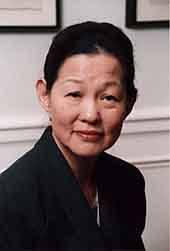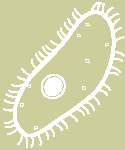|
Alice Huang
–
biologist
|

|
"
I don't believe that major paradigm shifts are the results of serendipity.
" |

|
| |
|
|
|
| |
How were you motivated to choose your particular field? |
| |
My father who was bishop of the Anglican–Episcopal ministry in southwest China once ruefully remarked, "If I had to do it over again, I would rather save bodies than to save souls." Remembering this at age 7, I decided that I would someday become a physician. But once in medical school, it became clear that saving bodies was a tedious one on one effort. Research, on the other hand, had the potential to save many lives. My first experiment in discovery had me hooked. I loved working in the laboratory, pouring solutions and measuring chemicals, as well as taking biological specimens and purifying those components that I needed.
There is something very exhilarating to be the first person and the only person in the
world to learn the results. To know about a discovery and to be responsible for communicating
it to the rest of the world is very exciting. And when that discovery can be translated into
knowledge that helps to cure a disease or makes our lives better, it is worth all the effort
and disappointments that precede it.
|
|

|
| |
|
|
|
| |
What can you share about your creative process? |
| |

|
|
Too much has been assumed about the genius with the light bulb coming on in her head. I don't believe that major paradigm shifts are the results of serendipity. Experimental research builds on many previous results, many by others, whose conclusions lead to new hypotheses to be tested. Some of those hypotheses may be blind alleys until finally one is tested that furthers the understanding of the problem. I had always thought that my research was built on obvious conclusions and hypotheses, and yet, somehow I was able to get ahead of others. Did I have particular insights? Was I better at synthesizing disparate results? Or was I in the right place and at the right time with a prepared mind? A bit of luck certainly helped, but there was a lot of hard work and commitment, too.
|
|
| |
|
|
|
| |
What ideas do you have for a future human community on Mars?
|
| |
Once humans have adapted to or controlled the physical surroundings, it is hoped that a community will be established where all individuals will have equal access to opportunities and where their capabilities will be maximized, all in the absence of man's inhumanity to each other.
|
|

|
|




